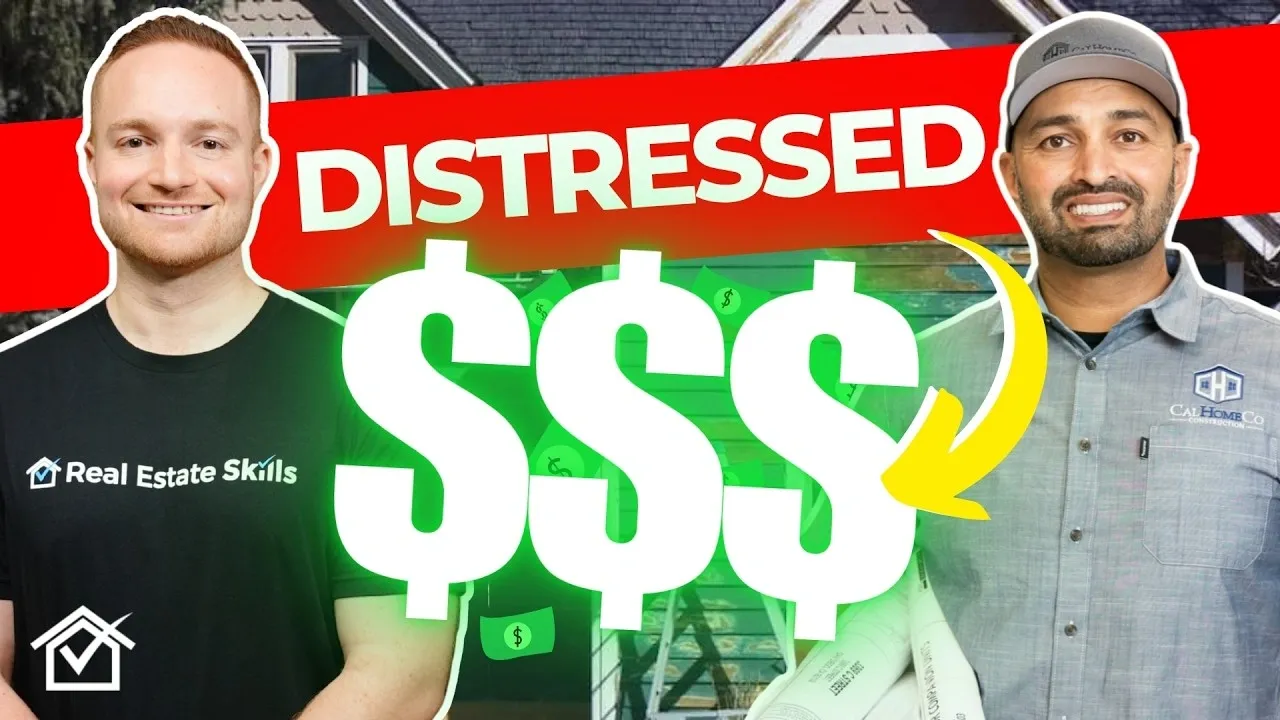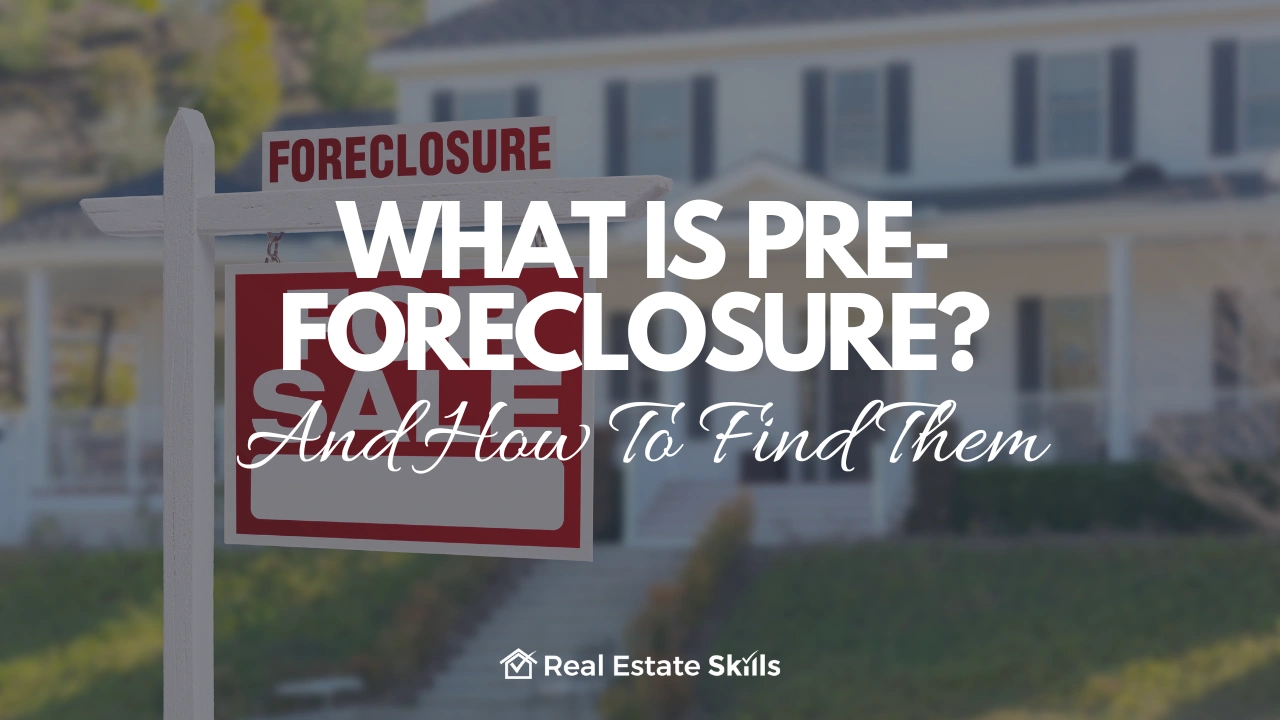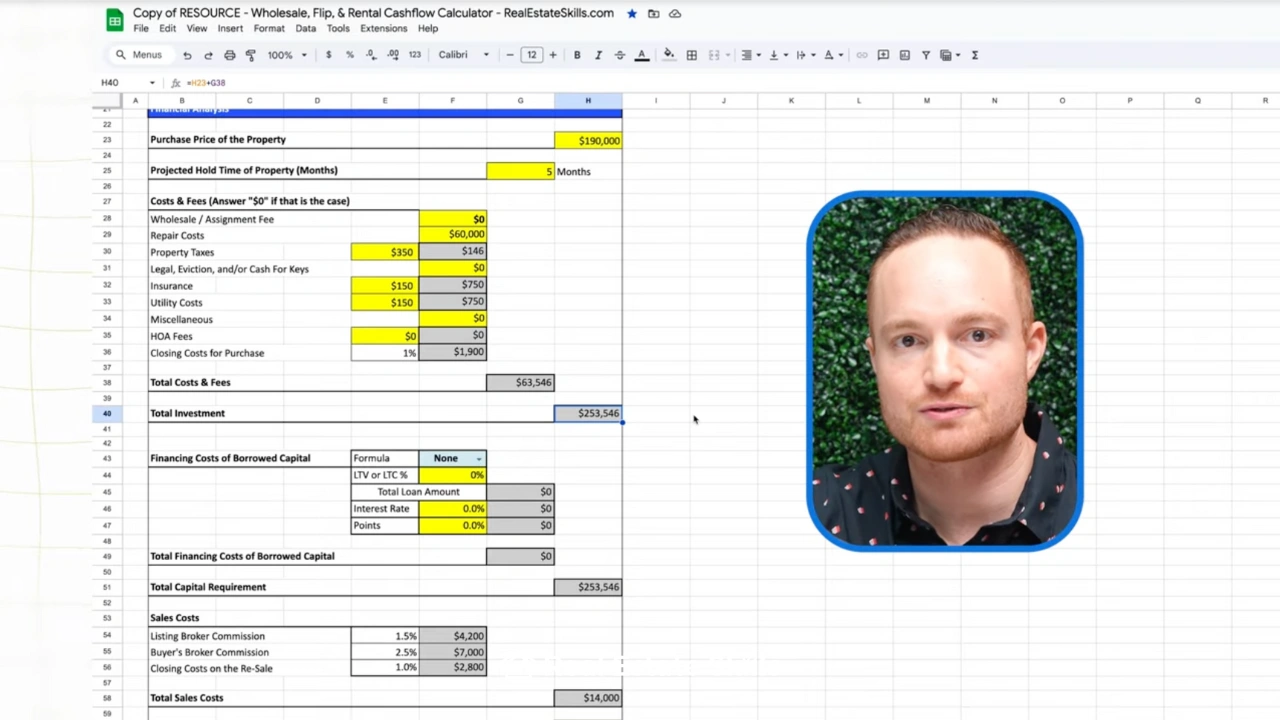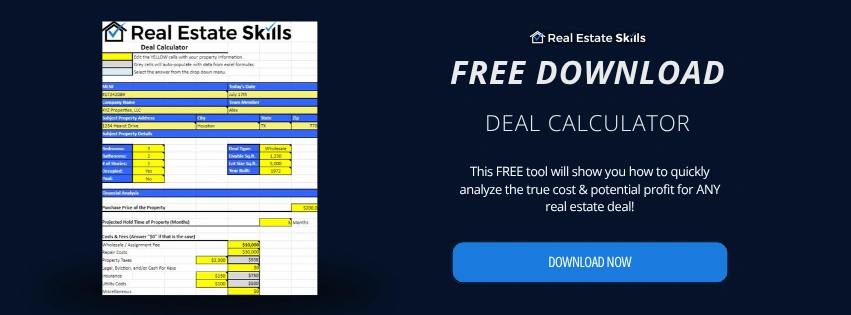How To Find Distressed Sellers & Close PROFITABLE Deals (The Right Way)!
Oct 17, 2025
If you’ve ever wondered how to consistently find motivated seller leads — the kind that turn into wholesale deals, fix and flips, and long-term rentals — then you need to understand distressed sellers.
In this article, we’re diving deep into distressed sellers in real estate — who they are, how to find them, and why helping them can be one of the most rewarding and profitable ways to invest.
Distressed sellers are the backbone of many successful real estate strategies.
By understanding what drives them to sell, you can structure deals that solve problems while creating win-win outcomes for everyone involved.
- What Are Distressed Sellers?
- What Is Pre-Foreclosure?
- How to Find and Work With Distressed Sellers in Real Estate
- What Is a Short Sale?
- What Is a Foreclosure?
- Other Types of Distressed Sellers
- Probate and Inherited Properties
- Absentee Owners and Unique Seller Cases
- The Most Profitable Seller Lists
- Why Distressed Sellers Matter to Investors?
- Finding Distressed Sellers Offline
- Talking to Distressed Sellers: Scripts and Tips
- Competing With Other Investors
- Winning Deals With Agents and Reputation
- Building a Trustworthy Investor Brand
If you’re serious about doing your first real estate deal, don’t waste time guessing what works. Our FREE Training walks you through how to consistently find deals, flip houses, and build passive income—without expensive marketing or trial and error.
This FREE Training gives you the same system our students use to start fast and scale smart. Watch it today—so you can stop wondering and start closing.
What Are Distressed Sellers?
A distressed seller is a homeowner who needs to sell quickly due to personal, financial, or property-related issues. They might be behind on payments, facing foreclosure, going through divorce, dealing with code violations, or inheriting a property they can’t maintain.
These homeowners are often overwhelmed and uncertain about their options. That’s where investors and agents who understand their situation can provide real solutions.
The key is to focus on helping first — not just making offers. By listening, understanding, and guiding them through a tough time, you build trust and open the door to creative deals.
Financial Distress vs. Property Distress
There are two main types of distress: financial distress and property distress.
Financial distress happens when the homeowner struggles to make mortgage payments or cover other financial obligations. They may have lost a job, experienced medical bills, or gone through a divorce.
Even if the house is in great condition, their finances create the motivation to sell.
Property distress, on the other hand, occurs when the home itself is in poor condition — deferred maintenance, outdated systems, or structural issues. The owner may not have the funds or energy to make repairs, so selling becomes the easiest option.
Some properties experience both financial and physical distress. These are often the best opportunities for investors who can solve both the financial problem and the property condition issue.
Distressed Sellers vs. Motivated Sellers
While “distressed sellers” and “motivated sellers” are often used interchangeably, there’s a subtle difference.
A motivated seller may be moving for a job relocation, downsizing, or wanting to cash out an investment. They’re ready to sell but not necessarily under pressure.
A distressed seller, however, has urgency — they’re facing a deadline or a difficult situation that forces them to act fast. Examples include foreclosure, bankruptcy, or a pending tax sale.
Understanding this distinction helps investors prioritize leads. Motivated sellers may negotiate harder or have time to wait for top dollar. Distressed sellers, however, are often more flexible and open to creative solutions because they need a fast resolution.
Read Also: 25 Questions To Ask Motivated Sellers: Investor’s (Ultimate) Guide
Importance of Understanding Distressed Sellers’ Mindsets
Working with distressed sellers requires empathy and patience. These homeowners are often stressed, embarrassed, or confused about their options.
If you come across as pushy or transactional, you’ll lose trust immediately. Instead, position yourself as a problem solver who genuinely wants to help. Ask questions like:
“What’s been going on with the property?”
“How can I make this easier for you?”
“What are you hoping to achieve by selling?”
By listening and understanding their mindset, you can tailor your offer to meet their needs — not just your profit goals. This is how lasting business relationships and referrals are built.
When you lead with empathy, sellers will often choose you over competitors, even if your offer isn’t the highest.

What Is Pre-Foreclosure?
Pre-foreclosure occurs when a homeowner falls behind on mortgage payments but the bank hasn’t yet taken the property to auction.
At this stage, the lender files a Notice of Default (NOD) or Lis Pendens (depending on the state) to inform the homeowner and the public that the loan is in default.
This is one of the best times for investors to step in because the homeowner still has control of the property. They can sell, refinance, or work with the bank to modify their loan before losing the home.
By helping sellers during pre-foreclosure, you can save them from foreclosure while acquiring property below market value.
Read Also: Wholesaling Pre Foreclosures
How to Find Pre-Foreclosure Leads
Finding pre-foreclosure leads starts with checking public records for Notices of Default or Notices of Trustee’s Sale. These are recorded at the county level and are available online or in person.
You can also use data platforms like PropertyRadar or PropStream to identify properties in pre-foreclosure and filter by location, equity, or loan amount.
Once you have a list, reach out to homeowners with a personalized, respectful message. Avoid sounding like a debt collector — instead, position yourself as someone offering options and relief.
Agents and investors who specialize in helping pre-foreclosure homeowners often build strong reputations and steady referral pipelines because they’re providing real value in a time of need.
Why Selling in Pre-Foreclosure Is Critical
Selling during pre-foreclosure gives homeowners the chance to avoid losing everything. Once a foreclosure sale happens, they’re evicted, their credit is damaged for years, and they lose any potential equity.
By selling before that point, they can protect their credit, possibly walk away with cash, and regain control of their situation.
From an investor’s perspective, pre-foreclosure deals are often smoother than buying at auction or dealing with REOs. You can negotiate directly with the owner, conduct inspections, and structure creative terms — like subject-to or seller financing — to make the deal work for both sides.
The goal isn’t just to find a deal but to help homeowners exit gracefully while building long-term success as a trusted real estate professional.
How to Find and Work With Distressed Sellers in Real Estate
What Is a Short Sale?
A short sale happens when a homeowner owes more on their mortgage than the property is worth. The bank agrees to accept less than the loan balance to avoid foreclosure. It’s not always easy to get a short sale approved, but when done right, it can help both the homeowner and the lender minimize losses.
Many short sales happen because of job loss, divorce, or unexpected financial hardship. The homeowner can’t keep up with payments, and selling at market value wouldn’t cover their debt. Instead of letting the bank foreclose, they ask the lender to approve a short payoff.
Banks will usually require documentation to show hardship—like pay stubs, tax returns, or medical bills. The goal is to prove that the homeowner isn’t trying to game the system but genuinely can’t afford the loan. The lender will then order an appraisal or broker price opinion to verify the property’s value before agreeing to the sale.
If approved, the bank issues a short sale approval letter. This allows the homeowner to sell the property to a new buyer, often at a discount, while avoiding the hit of a full foreclosure on their credit. The bank recovers part of the balance, and the buyer gets a potential deal.
How Short Sales Work
Short sales typically take longer than traditional sales because multiple parties are involved—the homeowner, the listing agent, the buyer, and the lender’s loss mitigation department. The lender must review the entire package, verify the value, and approve the offer before closing.
Some short sales are smoother when handled by agents experienced in this process. Others can drag on for months, especially if there are multiple loans or liens. It’s important for investors to understand the paperwork and be patient.
Unlike foreclosures, short sales give the homeowner more control. They can choose the buyer and negotiate terms. For the lender, it’s often cheaper and faster than foreclosing, maintaining, and reselling the property.
Why Sellers Choose a Short Sale
Sellers often choose a short sale because it lets them avoid foreclosure and the long-term credit damage that comes with it. They can walk away with a clean slate faster and potentially qualify for a new mortgage sooner.
It’s also less emotionally taxing than foreclosure. Homeowners feel better knowing they worked something out with the bank rather than having their property taken. In some cases, lenders even offer relocation assistance to help sellers move on.
For real estate investors, short sales can offer discounted purchase opportunities, though they take more time and effort. It’s a matter of helping distressed sellers find a solution that works for everyone involved.
How to Find Short Sales
To find short sales, start by checking the Multiple Listing Service (MLS). Many will be clearly labeled as “short sale” or “subject to lender approval.” You can also contact real estate agents who specialize in distressed properties or loss mitigation.
Public records are another resource. Notices of Default (NODs) indicate that a homeowner has fallen behind on payments, which can signal a potential short sale opportunity.
Investors can also use tools like PropertyRadar to identify pre-foreclosure properties. Once identified, it’s about reaching out, building rapport, and helping the homeowner navigate the process with their lender.
What Is a Foreclosure?
A foreclosure happens when a borrower stops making payments on their mortgage, and the bank takes legal action to repossess the property. In most states, the process begins after the homeowner misses several payments and receives a Notice of Default.
The lender then schedules a trustee’s sale, where the property is auctioned to the public. If no one bids high enough to cover the debt, the property reverts to the bank as Real Estate Owned (REO).
Foreclosures are the final step in the loan default process. They can take months or even years, depending on state laws and court backlogs. Once complete, the bank gains ownership and can sell the property to recover its losses.

How to Find and Buy Foreclosures
Just because a property is a foreclosure doesn’t mean it’s automatically a great deal. Even though the bank owns it, you’re still competing against other investors on the MLS. Banks want to recoup as much of their loss as possible, so they’ll often try to sell at or near market value.
In the past, when every bank had thousands of foreclosures, there were plenty of listings to choose from. Today, however, inventory is much lower. For instance, there are roughly 40 or so foreclosed homes in San Diego at any given time. Many of these are purchased by third-party investors at auction, since the lien amounts are often far below market value. Investors can bid at a price that allows room for repairs and profit.
On the MLS, these properties are labeled as REO or bank-owned. That’s the easiest way to find them. For pre-foreclosures, tools like PropertyRadar help you identify homeowners who have received notices of default—but remember, until a property is foreclosed, you must negotiate directly with the homeowner, not the bank.
If a home has already gone through foreclosure, the MLS is your best bet for finding available deals. But when it’s still in pre-foreclosure, outreach is key—educating the homeowner on their options and helping them make the best decision for their situation.
When it comes to buying a foreclosure, 99% of the time you’ll need to wait until the property is listed. Once it’s on the market as an REO, you can find it through the MLS and make an offer. Even though there’s competition, some homes are in livable condition and qualify for traditional financing—especially if they have functional kitchens, bathrooms, and heating systems.
Websites like HomePath.com, Fannie Mae’s foreclosure platform, also feature REO listings. While inventory there is limited today, it’s worth checking periodically. Overall, homeowners have built substantial equity over the past decade, which has reduced the number of foreclosures on the market. Many distressed properties are now sold to investors before reaching the bank-owned stage.
Read Also: How To Find Houses In Foreclosure To Buy (FAST & FREE)
Other Types of Distressed Sellers
Beyond foreclosures, there are many other types of distressed sellers. These include homeowners facing divorce, bankruptcy, probate, inherited properties, and code compliance violations.
In some cases, sellers are forced to sell due to lawsuits or financial judgments. For example, one client was involved in a car accident that resulted in a $700,000 settlement. She had to sell one of her properties to pay off the judgment, even though she didn’t want to.
Code compliance issues can also trigger forced sales. Overgrown yards, unsafe structures, or hoarding conditions often lead cities to issue fines or place liens on the property. When violations go unresolved, local governments can foreclose on the home to collect unpaid liens.
One memorable example involved a property so overgrown that trees were literally growing through the house and pool. The city was preparing to foreclose for code violations when the family intervened and sold the home. After extensive cleanup and repairs, the property resold for nearly double the purchase price.
Code violations aren’t typically visible on the MLS. However, they’re public record and may appear on city websites or recorded as liens on title. Real estate investors can work with title officers to identify properties with recorded compliance issues, which often signal a deeper level of distress and potential opportunity.
Another property involved a severe hoarding case where the city had already cleaned up once and billed the owner $20,000. Over time, the mess returned, leading to further complaints and liens. By stepping in, purchasing the home, and helping the owner relocate, we were able to resolve the code issues while still creating a win-win transaction.
Probate and Inherited Properties
Probate and inherited properties are another category of distressed sales, though they tend to be less urgent than foreclosures. These homes are often in dated condition, but the sale process is highly regulated.
In probate, a lawyer, a probate referee, and an appraiser are all involved. The property generally cannot sell for less than 90% of its appraised value, which can make negotiations difficult. For instance, one listing in Point Loma involved a 4,000-square-foot home in a $3 million neighborhood. The appraiser valued it high, but buyers weren’t biting due to its outdated layout and the $500,000–$600,000 needed for renovations.
Adding to the complexity, this particular property had 15 beneficiaries, all with different opinions on the home’s value. Situations like these often stall sales or create tension among family members.
While investors can occasionally find opportunities in probate sales, profit margins are usually slim. The best buyer is often an owner-occupant willing to take on renovations to create their dream home, rather than a flipper seeking quick gains.
What is probate?
So what exactly is probate? It’s a legal process that occurs when someone passes away without placing their property in a trust. Without a trust, the estate must go through the court system to verify ownership, notify all potential heirs, and authorize the sale or transfer of assets. The process is slow, expensive, and emotionally draining for families already dealing with loss.
That’s why it’s critical for homeowners to establish a living trust. For a few thousand dollars, you can prevent family disputes, save tens of thousands in legal fees, and ensure a smooth transfer of your property. For real estate agents, this is also an excellent way to add value—by connecting clients with estate attorneys who can help set up trusts before it’s too late.
In one case, an elderly woman in San Diego owned several properties but had no family. After helping her clean, repair, and sell one of her distressed rental units, we discussed the importance of estate planning. Her response: “I don’t have any family—no one who even knows my name.” It was a sobering reminder of how crucial it is to plan for the future, both to protect assets and ensure your legacy is handled properly.
Read Also: Probate Wholesaling: The Ultimate Guide | Real Estate Skills

Absentee Owners and Unique Seller Cases
Not all real estate situations fit the standard mold. Sometimes you come across unique sellers, like a homeowner without heirs who’s deciding whether to donate their estate to charity. In one such case, a woman without family wondered if she could leave her assets to a museum. That’s how museum wings get named!
Setting up a charitable remainder trust can ensure assets go where the owner wants them to—instead of the state.
What Is an Absentee Owner?
An absentee owner is typically someone who owns a property but doesn’t live there. They might live out of state, rent the property out, or have inherited it and live elsewhere. Essentially, they’re owners who are physically and emotionally detached from the property, often creating opportunities for real estate investors.
For example, one case involved an absentee owner whose property was in foreclosure. A non-owner was living there—the boyfriend of the deceased previous owner. After tracking down the rightful heir through skip tracing and outreach, the investor helped her recover $5,000 from the sale—money she didn’t know she could access. The buyer who purchased the home even ended up living with the deceased owner’s boyfriend. It was a wild situation, but ultimately a win for everyone involved.
Absentee owners often don’t realize there’s still value in their property—even when facing foreclosure or other distress. A short, respectful conversation can unlock opportunities they never knew existed.
How to Find Absentee Owners
Platforms like PropertyRadar make it easy to identify absentee owners. These tools compare the property address with the owner’s mailing address—if they don’t match, it’s likely an absentee owner. You can then filter for other indicators of distress such as pre-foreclosure status, high equity, multiple liens, or long ownership.
Combining these data points helps investors target owners more likely to sell. While not all absentee owners are motivated, layering additional factors like financial distress or deferred maintenance can highlight the best leads.
Many tools like PropertyRadar even allow targeted marketing, helping you reach absentee owners through direct mail or digital campaigns. These systems may cost a few hundred dollars a month, but one successful deal can easily cover the expense.
The Most Profitable Seller Lists
While absentee owners are valuable, many investors find their best results with pre-foreclosure sellers—homeowners who’ve received a Notice of Default or Notice of Trustee’s Sale. These owners are often highly motivated and open to solutions.
By building rapport and trust, you can offer to help them sell, modify, or even save their homes. Sometimes, the relationship itself becomes the reward—even if no deal happens immediately. When you genuinely help people through difficult times, they refer friends, family, and eventually call you back when they’re ready to sell.
Why Distressed Sellers Matter to Investors?
Distressed sellers create win-win opportunities. Investors can help homeowners avoid foreclosure, reduce stress, and walk away with cash—all while acquiring properties below market value.
These direct transactions often bypass agent commissions, inspections, and the traditional listing process.
For sellers, it’s fast and low-stress. For investors, it’s a chance to create equity through renovation or creative financing.
Even in hot markets, there are always homeowners struggling with payments, deferred maintenance, or complex situations. Being the professional who can guide them through their options is both profitable and deeply rewarding.
Finding Distressed Sellers Offline
While digital lead generation tools are powerful, offline methods can be just as effective. One classic strategy is door knocking—directly visiting homeowners in pre-foreclosure or distress.
Mailers and phone calls often get ignored, but face-to-face contact builds trust and empathy. By showing up, listening, and offering genuine help, you can convert leads that competitors never reach.
For efficiency, create a route or “farm area” using platforms like PropertyRadar, mark properties in distress, and send trained team members or assistants to initiate contact. A single good deal can easily justify the time and effort.
Some investors also drive neighborhoods looking for visible signs of distress—overgrown lawns, peeling paint, or boarded-up windows. These “driving for dollars” opportunities can lead to conversations with homeowners who might otherwise slip through the cracks.

Talking to Distressed Sellers: Scripts and Tips
Approaching and talking to distressed sellers requires empathy, professionalism, and a structured process. Many successful investors use the assistant frame—having team members initiate contact and set appointments for the main investor to follow up.
A typical script might sound like this:
“Hi, our company specializes in helping homeowners who’ve had trouble with their mortgage. We’ve helped several people recently at no charge—would you like to see what your options are?”
Once the seller shows interest, the assistant introduces the lead investor:
“I can connect you with our expert who’s helped others in your situation. He’ll review your options and see what’s best for you.”
This structure builds authority and trust. By the time the investor meets the homeowner, they’re already perceived as credible and caring—turning what could be a cold call into a warm, qualified lead.
Over time, you’ll learn to handle common objections like “You’ve got the wrong info,” “I already have an attorney,” or “I’m not late on my payments.” With practice, you’ll recognize these as defense mechanisms and can gently redirect the conversation toward solutions.
Competing With Other Investors
Competition is inevitable. Sellers in distress often receive multiple offers from investors and agents. The key is authenticity and follow-through.
Some investors make high offers but renegotiate at the last minute—a practice known as “bait and switch.” If you’re transparent and reliable, you’ll stand out. Share stories, educate sellers and agents on what to watch out for, and build a reputation for integrity.
In one case, an investor lost out on an initial bidding war for a property. But when the chosen buyer tried to renegotiate, the listing agent remembered the investor’s professionalism and called him back. He bought the home, renovated it, and sold it for a substantial profit—while earning the agent’s lasting trust and future referrals.
Winning Deals With Agents and Reputation
Reputation is everything. When agents trust that you’ll perform, close quickly, and deliver quality results, they’ll prioritize working with you. Over time, that network grows—turning into a steady stream of off-market opportunities.
By consistently doing good work, treating people fairly, and maintaining high construction standards, you become the trusted investor in your market—the one agents call when they need a deal done right.
Building a Trustworthy Investor Brand
Every investor faces skepticism, especially in markets where “flippers” cut corners. Building a trustworthy brand means doing things by the book, getting proper permits, and prioritizing quality.
Even when a neighbor complained about potential code issues, one investor took it as an opportunity to pull permits, delay slightly, and ultimately sell in a hotter market—earning an even higher profit.
Integrity, transparency, and quality don’t just protect your reputation—they enhance your results. In this business, doing things right pays off.
If you’re serious about doing your first real estate deal, don’t waste time guessing what works. Our FREE Training walks you through how to consistently find deals, flip houses, and build passive income—without expensive marketing or trial and error.
This FREE Training gives you the same system our students use to start fast and scale smart. Watch it today—so you can stop wondering and start closing.
*Disclosure: Real Estate Skills is not a law firm, and the information contained here does not constitute legal advice. You should consult with an attorney before making any legal conclusions. The information presented here is educational in nature. All investments involve risks, and the past performance of an investment, industry, sector, and/or market does not guarantee future returns or results. Investors are responsible for any investment decision they make. Such decisions should be based on an evaluation of their financial situation, investment objectives, risk tolerance, and liquidity needs.







